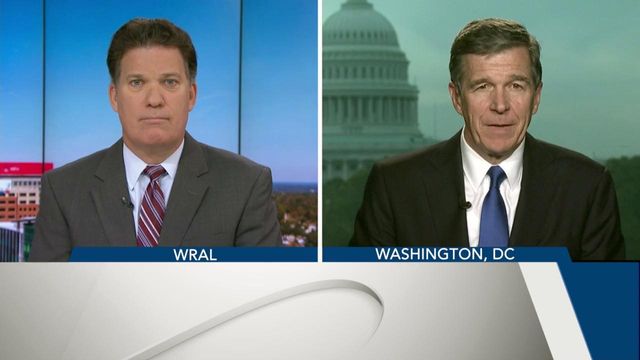Cooper lobbies Washington for more Florence recovery money
Two months after Hurricane Florence hit North Carolina, Gov. Roy Cooper headed to Washington, D.C., on Thursday to push for more federal disaster recovery aid.
Posted — UpdatedCooper met with members of North Carolina's congressional delegation to line up their support, as well as with Secretary of Housing and Urban Development Dr. Ben Carson and RADM Doug Fears, the White House Homeland Security adviser.
Less than a quarter of people affected by Florence had flood insurance, and half lived at no more than 150 percent of the poverty level, the governor said.
"We have to help them. I think all of North Carolina wants to pull together to help them," he said. "Now, it's time for the federal government to step up and do what it needs to do."
Cooper said his administration has learned lessons from the often slow response to Hurricane Matthew two years ago, and he has created a state Office of Recovery and Resilience to coordinate state and federal efforts.
"We want to move at a much faster pace," he said. "I think we will move significantly faster and make sure that we get this money on the ground, get people's homes rebuilt and get people out of harm's way."
Some people were hit by both Matthew and Florence, and Cooper said North Carolina has asked the U.S. Department of Housing and Urban Development for flexibility in awarding grants to help them rebuild without having to parse out which storm caused what damage.
Most of the recovery money will go toward immediate assistance for hurricane victims, but the governor said some planning needs to be done to ensure homes and businesses are either moved from flood-prone areas or elevated so floodwaters can't damage them again.
"Everything we do has got to be based on the fact that we know these storms can come again," he said, noting highways and other infrastructure also might need to be raised.
A recent WRAL Investigates report found that state leaders have ignored for decades recommendations to control flooding along the Neuse River, such as building more reservoirs or "dry reservoirs," which provide parkland much of the time but can hold floodwaters when needed.
Cooper said the extensive flood mapping the state has done in recent years provides a good base to determine how to prepare for future flooding, but more studies are needed on whether reservoirs are cost-effective. Diverting floodwaters from one place only means they go someplace else, he noted.
"We know flooding is coming again. We have to be ready for it, and we have to work to make sure that we are more resilient, and when we do have flooding, we lessen the impact," he said.
• Credits
Copyright 2024 by Capitol Broadcasting Company. All rights reserved. This material may not be published, broadcast, rewritten or redistributed.






